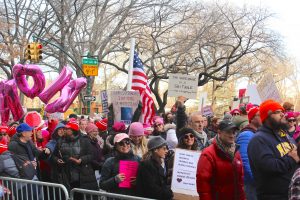By Jana Tehfe

On Thursday, Jan. 25, Piers Morgan was interviewing President Donald Trump at the World Economic Forum in Davos, Switzerland, when he finally posed the question, “Do you identify as a feminist?” The British TV host later tweeted, “BREAKING NEWS: Trump is not a feminist.” In an obvious tone, Morgan clarified by adding that Trump stated, “No, I wouldn’t say I’m a feminist. I mean, I think that would be, maybe, going too far. I’m for women, I’m for men, I’m for everyone. I think people have to go out, they have to go out and really do it, and they have to win. And women are doing great, and I’m happy about that.”
The fact that our President was frank and unreserved in claiming he is not a feminist has become a major concern to some, as our country is in the midst of the #MeToo revolution and holds annual Women’s Marches. How worrisome is it that Trump claimed he is not a feminist? Trump’s comment should not be as concerning as the fourth-wave feminists believe it to be. Feminism is defined as “the theory of the political, economic and social equality of the sexes.” In today’s society, the meaning has gone beyond the dictionary definition. Feminism has taken on a negative connotation because of, dare I say it, extremists.
Many people believe that men and women should have equal rights, but they are hesitant to call themselves feminists in fear of being associated with the people who man-hate or the ones who take their actions and words one step too far. Now, we know that not all feminists illustrate this stereotype, but nonetheless, this is the image people conjure up in their minds when the word feminism is brought up. Trump’s first claim is that he is not a feminist, but his explanation says otherwise, at least according to the dictionary definition. People are too focused on the beginning of Trump’s statement, disregarding his explanation for why. He does say that he is for both women and men, and that he is happy for women because they are putting themselves out there and succeeding.
According to the literal meaning of feminism and his explanation, Trump does believe in equality, but he would not call himself a “feminist” because it would be “… going too far.” This shows that Trump, like many others, sees the word feminist and shies away from the label because of the negative implication around it. However, his explanation does identify him as supporting feminist philosophy. Feminism’s main concern is that President Trump is not supporting them because of his declaration, but if people listen to his full claim, they will see his statement does support feminist ideals. Even if Donald Trump did claim he was a feminist, how would that change the movement? The fourth wave of feminism is in full swing, whether people like it or not, and Trump knows this. Trump’s stance, whether for the movement or against, will not stop the movement from taking place.
It is understandable that feminists would like someone with influential political power to be on their side, but Trump would do nothing else for the movement than provide moral support. This idea is backed up by past presidents. In Sep. 2016, President Barack Obama called himself a feminist in an essay written in Glamour Magazine. While yes, the statement may have been a confidence boost to the feminist movement, that was all it was. Nothing changed simply because Obama identified himself as a feminist. If anything positive happened for the movement, it was not because of one man’s claim. On the other hand, there have also been presidents who opposed social movements of the time, and the nation saw change regardless, but we have still seen change in the nation. Woodrow Wilson was not completely for the women’s suffrage movement at the beginning of his presidency. His support was indifferent at best. Yet, a few years later, women earned the right to vote. During the Vietnam War, President Dwight Eisenhower pledged his support to South Vietnam, even amidst all the protests against the war in the United States. This action did not stop the Vietnam War from eventually ending and our troops from returning home.
The opinion of the president should not be as big of a concern as people may think. One opinion is not going to alter the full course of a social and political movement. However, the unified actions of many will. The feminist movement should concern itself with convincing the rest of the nation to unify for its cause. Trump’s claim will not be a barrier to doing so, just as Eisenhower’s support for the Vietnam War did not stop it from ending or Wilson’s opposition did not stop women from gaining the right to vote. At the end of the day, people’s biggest concern should not be whether the President is for or against the movement, but it should be how to convince a full country to back up our cause in order to get something done. One man’s opinion, even the President’s, will not be the barrier that prevents change.
Jana Tehfe, FCRH ’21, is a political science major from Brooklyn, New York.


































































































































































































